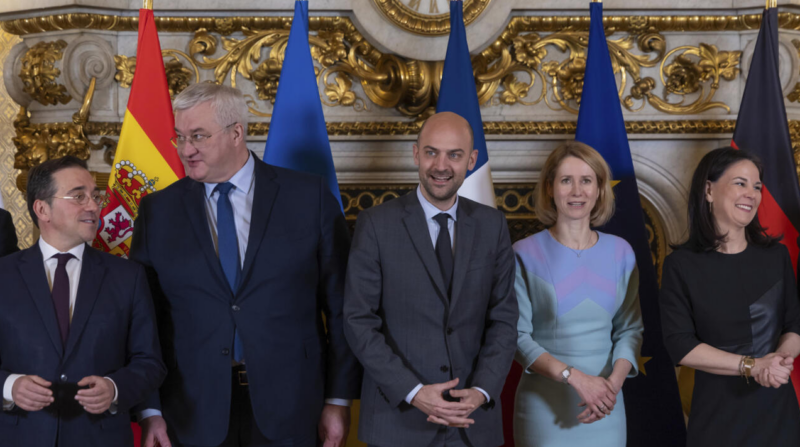European leaders scrambled on Thursday to try to get a seat at the table in Ukraine peace talks after US President Donald Trump announced the start of negotiations after speaking directly to Russian President Vladimir Putin in a phone call.
Trump’s move sent shockwaves through European capitals, which want a central role in peace talks because any settlement in Ukraine, hit by a full-scale Russian invasion three years ago, will have ramifications for their own security.
German Chancellor Olaf Scholz warned that the Ukraine conflict must not end with an “dictated peace”.
“The next task is to ensure that there is no dictated peace,” Scholz said in an interview with Politico.
NATO Secretary General Mark Rutte stressed that Ukraine must be involved in peace talks and any final deal to end Moscow’s war on Kyiv needs to be “enduring”.
“Of course, this is crucial – (when) we talk about Ukraine, that Ukraine is closely involved in everything happening about Ukraine,” Rutte told journalists ahead of a NATO meeting defence ministers in Brussels on Thursday.
‘Crucial moment of truth’
French Defence Minister Sébastien Lecornu on Thursday warned that NATO faces a moment of reckoning as the US and Russia set in motion negotiations to end the Ukraine war.
“It’s a crucial moment of truth,” said Lecornu. “People call it the most important, the strongest military alliance in history. That’s historically true – but the question is, will it still be true 10 or 15 years from now.”
His German counterpart, Boris Pistorius, said it was “regrettable” that the Trump’s administration had made “concessions” to Russia before peace talks on Ukraine had even started.
“In my view it would have been better to speak about a possible NATO membership for Ukraine or possible losses of territory at the negotiating table,” Pistorius said ahead of the NATO meeting.
Russia would be remain a threat to Europe’s security even if an agreement for peace in Ukraine can be reached, Pistorius added.
“It would be naive to believe that this threat, even after any peace agreement whenever it materialises, would in fact subside,” he said.
“That’s why we have to invest faster and more in our defence and security capabilities. Peace, this has unfortunately been the experience over centuries, can only be secured from a position of strength,” he added.
Their comments came the morning after Trump took the world by surprise when he announced that the US and Russia had agreed to “have our respective teams start negotiations immediately” on Ukraine during a phone conversation between Trump and Putin.
Following Trump’s revelations, the foreign ministers of France, Germany and Spain insisted that any peace deal in Ukraine could not be achieved without the involvement of Kyiv and its European partners.
“There will be no just and lasting peace in Ukraine without the participation of Europeans,” French Foreign Minister Jean-Noël Barrot told a foreign ministers’ meeting in Paris, while his German and Spanish counterparts added that no decisions could be taken without Ukraine.
‘Peace in Europe is at stake’
German Foreign Minister Annalena Baerbock on Thursday reiterated the message that Ukraine and Europe need to be involved in peace talks about Ukraine.
“We can’t have talks without involving Ukraine. Peace in Europe is at stake, that’s why we Europeans need to be brought in,” Baerbock said in an interview with Deutschlandfunk radio.
The German foreign minister said she had not been informed of Trump’s phone call with Putin in advance.
“This is the way the Trump administration operates. That is why constant mutual communication is needed with the various players. That, too, is different from other times. This is not how others do foreign policy, but this is now the reality,” said Baerbock, a member of the Greens party.
UK Defence Secretary John Healey echoed Baerbock’s comments, insisting that Ukraine and Europe should participate in negotiations with Russia to bring an end to the conflict.
“Let’s not forget, Russia remains a threat well beyond Ukraine,” said Healey. “There can be no negotiation about Ukraine without Ukraine. And Ukraine’s voice must be at the heart of any talks,” Healey told reporters in Brussels.
Trump’s peace push ‘not a betrayal’, says Hegseth
US defence chief Pete Hegseth however told reporters on Thursday that Trump’s peace plan was “not a betrayal” of Ukraine.
“There is no betrayal there. There is a recognition that the whole world and the United States is invested and interested in peace, a negotiated peace, as President Trump has said, stopping the killing. And so that will require both sides recognising things they don’t want to,” said Hegseth.
Speaking to reporters in Brussels before the start of Thursday’s NATO meeting, Hegseth said it was Europe’s responsibility to stop the Russian “war machine”.
Hegseth repeated his call for increased defence spending by NATO countries, which he said should ultimately reach 5% of gross domestic product.










